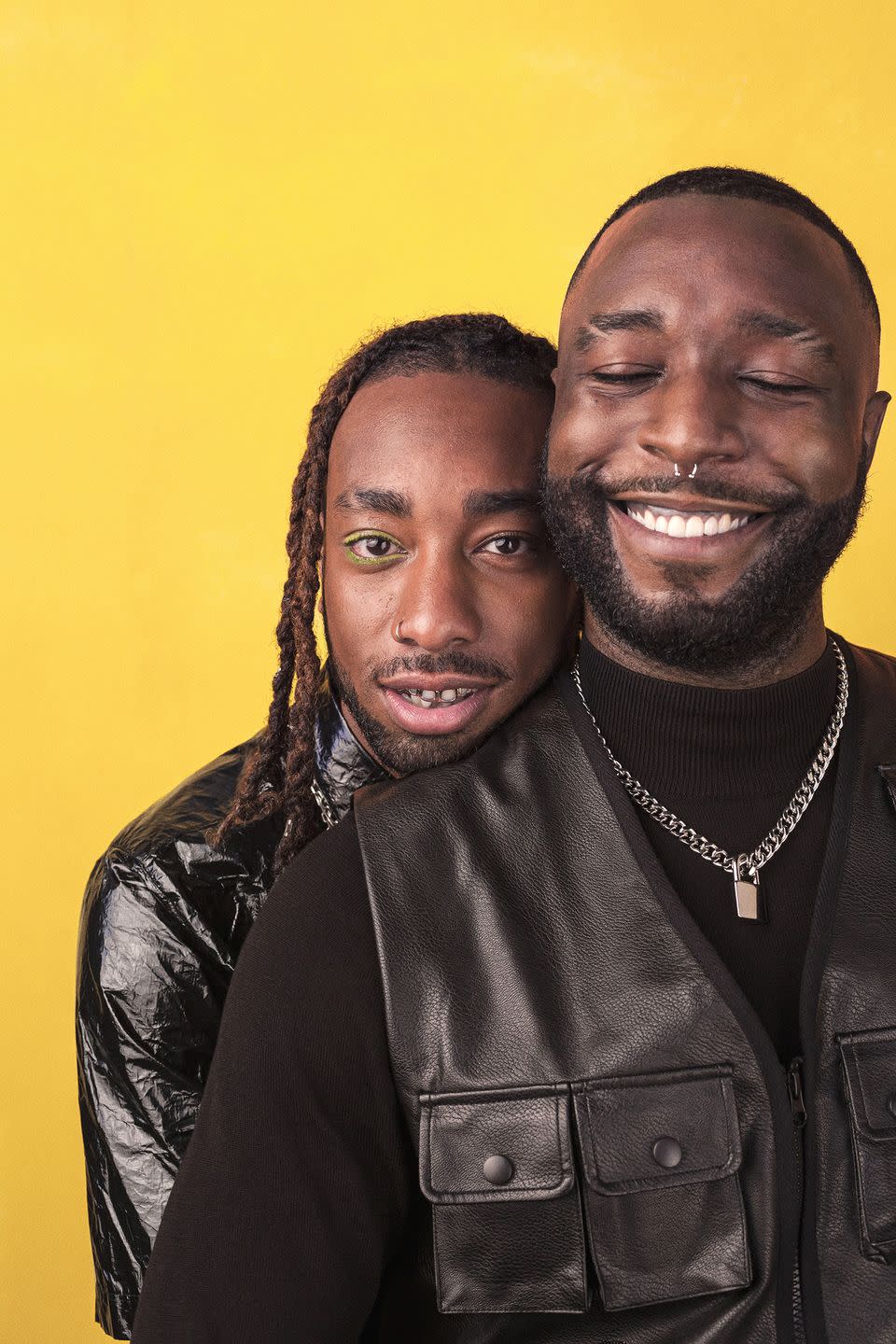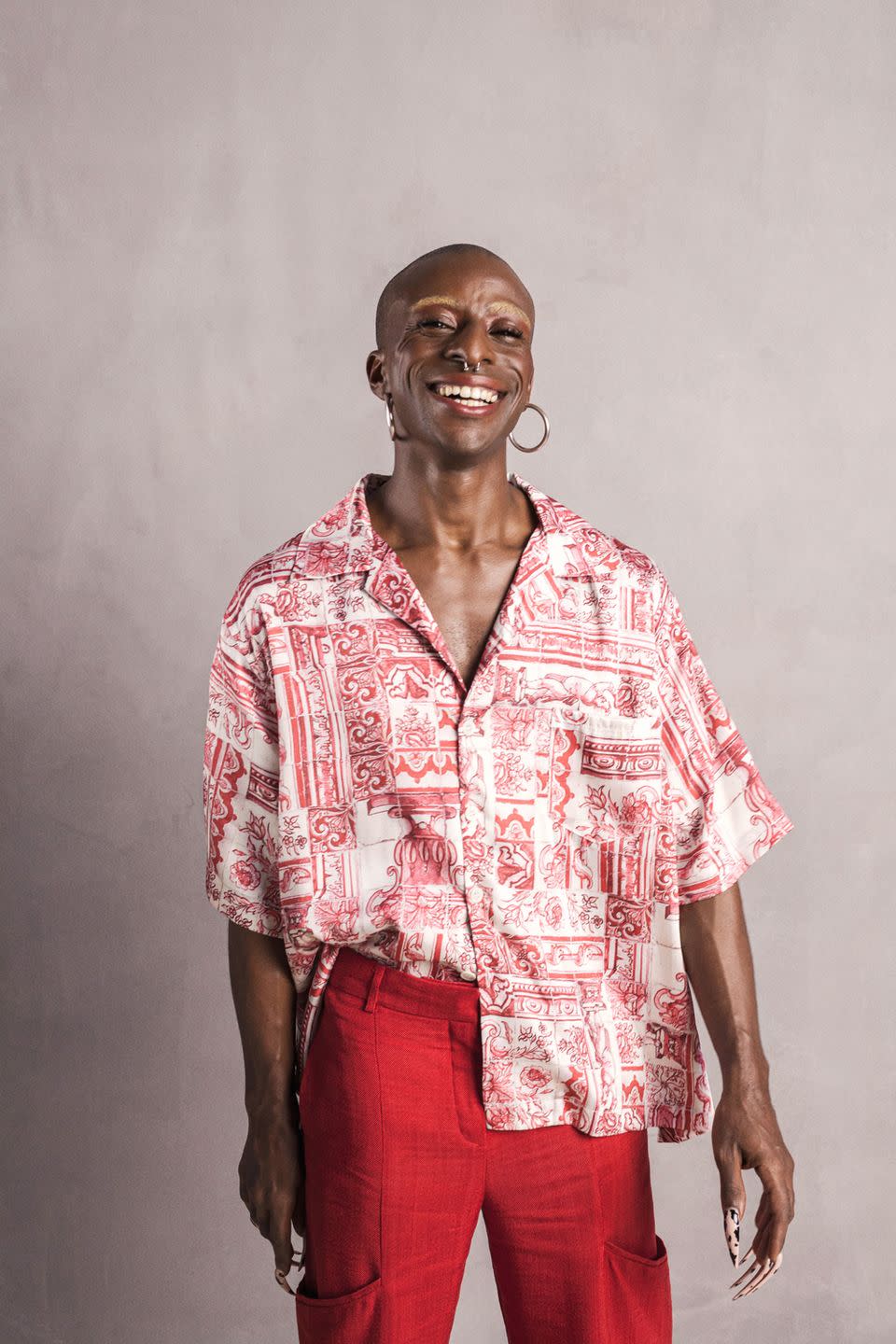"I’ve never felt a peace in my heart like it": The power of queer Black love
New research from Bumble has found more than half of Black people in the UK don’t see themselves represented in images of love in mainstream online spaces. Among Black women, that figure rises to 67%. All you have to do is Google words like "romance", "relationship" and "couple" to see very few (if any!) images of Black couples come up. Representation is even more lacking for queer Black couples.
This is why Bumble has launched a new campaign to better document and represent Black love. #MyLoveIsBlackLove is all about sharing real, unscripted reflections on what love means, and diversifying the narratives of the Black experiences reflected in mainstream media. To celebrate the power of queer Black love and highlight the impact the lack of representation has on your view of relationships, these three couples are sharing their love stories.
"I love being loved by a Black woman. I’ve never felt a peace in my heart like it"
says Tanya Compas, 28, She/Her

"I met my girlfriend at a club night at a Pride event back in 2018. I drunkenly told her I’d take her out on a date and here we are, over two years later, madly in love.
Love is vulnerability, love is warmth and to me, love is a verb. It’s a commitment to someone and to yourself, no matter whether it is romantic or platonic. It’s a commitment to be honest, to be vulnerable, to be open to change, to have difficult conversations and to grow together and individually. It’s so easy for people to look at love and think that it’s easy. In theory it is, falling in love is the easy part. But staying in love, being in a relationship, sharing your life with somebody else, that is where it becomes challenging. But for me, this is a challenge I’m willing to embark upon, because the love I feel in return is so very worth it.
On one hand, the erasure of queer and trans Black couples creates the idea that in order to have a queer relationship you must emulate the relationships of the cishet [cisgender heterosexual] couples we see in mainstream media. This idea that women must be submissive and of service to men.
On the other hand, people, particularly cishet women create this almost romanticised ideal of queer relationships, especially those between two women. Like it must be really easy and dating a woman is the ‘safe’ and ‘easy’ option. But there is nothing easy about being in a queer relationship, especially when it comes to navigating wider society, especially as a Black couple.
My suga dumplin, this love is really shweeeeet🥰 Shot on iPhone by @elu.sade
A post shared by Tanya Compas🇬🇧🏳️🌈 She/Her (@tanyacompas) on Sep 30, 2020 at 8:37am PDT
Furthermore, they create this idea that toxic relationships are just a cishet issue, but the reality is that domestic violence and toxic relationships unfortunately still take place within queer relationships. They just aren’t spoken about or platformed as much. But they should be.
Not seeing myself reflected in love stories has impacted me hugely. As someone who identified as cishet until I was 23, when it came to dating women, I felt like queer relationships had to be like the prior relationships I had with men - there must be one masculine person and one feminine person. One person who is dominant and one who is submissive. At the beginning I fulfilled the feminine and submissive role, but I was completely negating my own wants and needs in the process.
It was only when I really came into the community and saw relationships between other queer Black people that I realised the freedom that came with being in queer relationships. You can really liberate yourself from cis-heteronormative ideals and ‘rules’ we have been socialised and conditioned to follow. There is freedom in queer relationships, but sometimes you have to see it to believe it.
I love, love. I love being loved by a Black woman. I’ve never felt a peace in my heart like it. I feel seen by my partner. Like really seen. Beyond my aesthetics, beyond what work I do, just me, stripped bare. Everyone deserves to feel a love like I do."
If anyone is experiencing any violence within relationships, whether it is romantic, platonic or familial, you can seek support from GALOP, an LGTBQ+ anti-violence charity.
"We want to be the representation we never had"
says Donnie Sunshine, 32, He/Him

"Me and Jazz have been together just coming up a year and a half. We met so organically. I was DJing at an event and Jazz was working at the event right in front of the DJ booth. He came over and complimented my music selections and we got on straight away, although we didn’t exchange any contact details there and then. A few days later he followed me on a social media app, and I messaged him and said that I thought he was cute and the rest is history.
As cliché as it may seem it was like love at first sight, well more like third sight as it wasn't until we met outside of work at London Black Pride. From the moment we connected and our souls have stayed attached ever since. We left together hand in hand walking to the station, and we just spoke for ages. I'd never felt such an ease when expressing myself, and genuine intrigue when listening to someone speak, there was so much synergy between us.
What I love the most about Jazz is his calmness. I’m an extremely anxious person, so he really helps centre me and makes me feel safe and confident. I would say that I do the same for him but in a different way, I support and care for him. We’re like yin and yang, we balance each other out.
To me, love is understanding that you are no longer on a solo linear path, it’s teamwork and partnership. It's communicating, laughing, and making time for each other but ultimately it’s finding someone you can not only talk to about anything but someone that will listen and truly care. Love is also about foresight and wanting to build together as one. To put it simply: we are best friends with the added bonus of romance and intimacy.
A post shared by Donnie Sunshine (@donnie_sunshine) on Oct 2, 2020 at 4:04am PDT
There are harmful messages about love that we internalise, especially within marginalised communities. Being Black and gay, you’re made to feel that you have to work twice as hard to get half as much in life - and that is the same when it comes to love. You feel like you have to fulfil all of these criteria to be worthy of love, when that’s not the case.
When you don’t see something, like representation of queer Black love, it seems less possible so you don’t even try to reach for it. In my past relationships, I would be content with a lack of commitment, because I would feel grateful to even have what I had, as it seemed to be such a rare thing. That mindset allowed me to settle for a far less than my worth.
We want to be the representation we never had. We know that seeing is believing, and hope that our visibility gives others then confidence to love and love just as freely."
"The gay scene made me realise I'd internalised Eurocentric ideas and beauty standards"
says Ola Awosika aka Glow with Ola, 38, He/Him

"My ex and I were together for two years. We met in the smoking area of a now sadly closed down East London gay bar. It was lust at first Marlboro Light. We got on so well because we were able to have conversations about music, art and politics. We talked about our families and I opened up to him about childhood trauma in ways I never had with anyone before, not even my friends.
Looking back, I was far too immature and needy to be in a relationship. We’re not together anymore, but have remained friends and to this day he’s one of the most important people in my life.
Love to me means nurture, safety and understanding. In practice that means supporting your partner emotionally, encouraging them to pursue their dreams and giving them space to flourish. I’ve learned that relationships can only thrive if both partners give each other room to grow. I mistakenly looked for past relationships to “fix” me rather than looking at them like two people who are together because they want to be rather than need to be.
Sometimes we internalise unhealthy ideals of romantic love thanks to pop culture, which makes us see love through a binary lens. Traditionally it’s always man-and-woman, and while we’re seeing more queer representation even within LGBTQ couples we sometimes have to unpack the heteronormative rules society dictates. The idea that you need a partner to fulfil you, to 'complete' your life is very outdated. I want someone to add value to my life, but not be the main overarching focus.
I didn’t realise the impact of not seeing myself reflected in the narrative of love until I entered the gay scene and realised that I’d internalised Eurocentric ideas and beauty standards. Thankfully, representation of Black queer people has increased and now rather than it simply being about 'hooking up' I now feel a stronger sense of community, friendship and family than ever before. It’s encouraging to know that we have each other’s backs and that we exist as growing up I felt like 'the only one'.
My love story is a journey of self-discovery and growth. Love is allowing yourself to be vulnerable and open, but still retaining who you are as a person. Learning to stay true to my authentic self has, I feel, instilled in me the right tools to date and love again because now I’m far more self-assured and not looking to be 'saved'. I want people to be inspired to invest in themselves because that will help you to build healthy relationships."
SUBSCRIBE HERE to have Cosmopolitan delivered to your door.
Like this article? Sign up to our newsletter to get more articles like this delivered straight to your inbox.
LOOKING FOR YOUR NEXT FAVOURITE PODCAST? LISTEN TO COSMOPOLITAN'S ALL THE WAY WITH... ON APPLE
You Might Also Like

